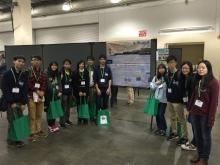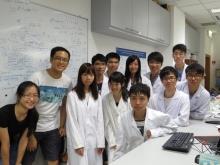A genetic engineering team formed by 11 undergraduate students of science and engineering at The Chinese University of Hong Kong (CUHK) has won a gold medal at the iGEM (international Genetic Engineered Machine) 2014 Giant Jamboree held in Boston, USA. The team successfully modified the genome of a nitrogen-fixing bacteria, which can potentially solve many environmental problems. The winning project of the CUHK team was named ABCDE (AzotoBacter vinelandii Cluster-transformable & Deoxygenated protein Expression system). Azotobacter vinelandii is a bacterium that naturally exists in soil. By mutating the genome of it, CUHK iGEM team has successfully developed an intracellular anaerobic protein expression system, in which different oxygen sensitive proteins or enzymes will be able to function. By adding remodeled nitrogenase and hydrogenase, the bacteria can covert carbon dioxide into methane and other carbon compounds in a natural aerobic environment. As methane can be used as a biofuel, the conversion will help to solve both environmental and energy problems. By adding different enzymes, the protein expression system has many other potential applications, such as manufacturing a biobattery or a nanomagnet. Please visit the website of the School of Life Sciences for details: http://www.sls.cuhk.edu.hk/index.php/undergraduate-programmes/msbbs-article-2/dream-program-2/igem-2014. (This project is partly supported by the Teaching Development Grant 2012-15 of the University Grants Committee). Prof. Chan King-ming, one of the instructors of the team and associate professor of the School of Life Sciences, CUHK remarked, ‘The creativity of the students is admirable. Previous studies in genetic engineering mainly focused on Escherichia coli and yeast, while our students pioneered the use and development of nitrogen-fixing bacteria, which can bring new opportunities for biological engineering. This new expression system has a high potential for various applications, such as the conversion of carbon dioxide into methane, bringing new hope in the fight against global warming.’ About iGEM Competition This year, the iGEM foundation celebrated its 10th anniversary and invited all participants to compete in the Giant Jamboree held at the Hynes Convention Centre in Boston. There were a total of 243 teams with close to 3,000 people participating in this Championship competition from around the world. Among them, 79 teams achieved gold medal standard in the competition. Established by the Massachusetts Institute of Technology in 2004, iGEM is an annual premier synthetic biology competition worldwide to foster students' learning in synthetic biology, promote collaboration among students and nurture biology talents. Participating teams are required to specify, design, build, and test simple biological systems made from standard, interchangeable biological parts. The accomplishments of these student teams often lead to important advances or provide solutions to tackle problems in medicine, food and nutrition, energy, and the environment. For more information, please visit http://www.igem.org. | 
| | The CUHK genetic engineering team in the iGEM 2014 Giant Jamboree in Boston, USA. |
 | | The genetic engineering team formed by undergraduate students of science and engineering at CUHK. |
|